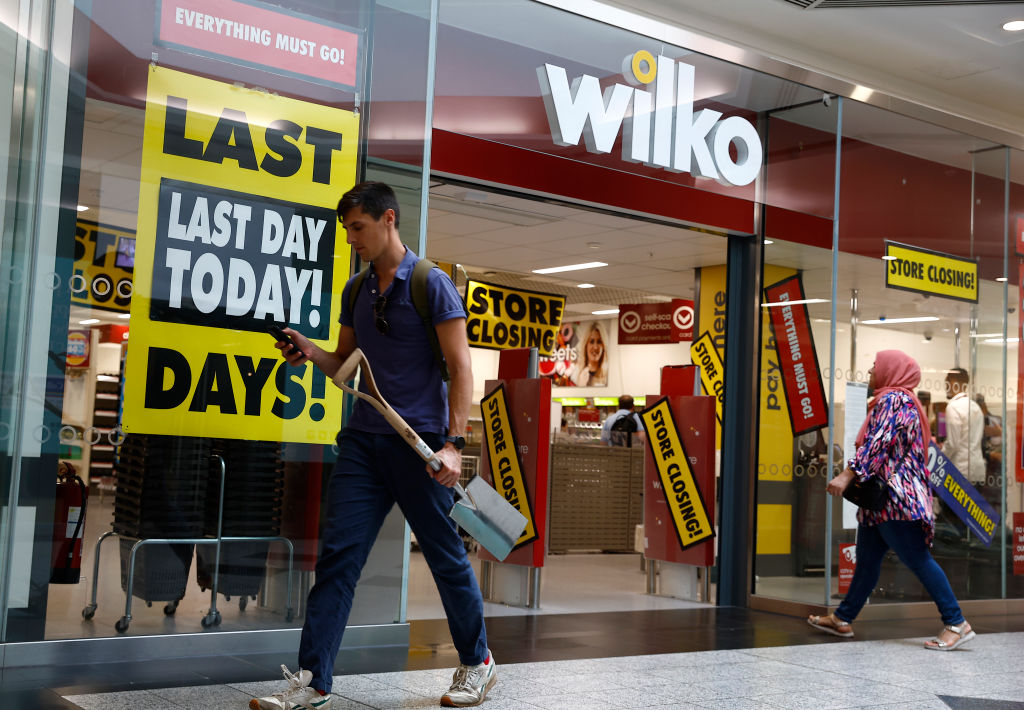The closure of 400 Wilko stores – at the cost of 12,500 jobs – spells more misery for the high street. Wilko joins a pantheon of big brand names who have been forced to shut their doors since the pandemic. We have seen the loss of Debenhams, the Arcadia Group (which owned Dorothy Perkins, Topshop and Topman), Victoria’s Secret, Paperchase, Oasis and Warehouse, Made.com and Cath Kidston among many others.
According to the British Retail Consortium, the crisis on our high streets goes back further, with 6,000 storefronts closing since 2018. Last year was the worst year for retail in five years, seeing the loss of 150,000 jobs from the high street and out of town shopping centres.
The situation has become so bad that Dame Sharon White, boss of John Lewis, has called for a Royal Commission to investigate how to revitalise our high streets, the first of its kind since the Victorian era. She identifies rising crime, ‘unfair’ business rates, poor planning rules, and the government’s ‘tourist tax’ as all contributing to the slow strangulation of the high street.
Dame Sharon’s intervention is helpful, and probably more useful than an expansive and lengthy investigation. She is right about the fundamentals: on crime, police performance is an at all-time low, with Home Office figures showing just one in 20 offences being solved last year. Tackling ‘high-volume’ crimes such as theft is particularly bad, with many police forces having stopped investigating such offences altogether.
Shop thefts logged by retailers have more than doubled in the past six years, reaching 8 million in 2022, and yet shoplifting offences recorded by the police have remained broadly static over the past decade – hovering around a mere 300,000. Surveys of shopworkers show that a third of such thefts involve violence, threats and abuse. More than half of those interviewed felt that reporting such crimes wouldn’t make any difference. The first step in saving the high street must surely be re-establishing basic law and order so that shops can conduct their business without fear.
The current system of business rates imposes another crushing burden. This Byzantine scheme sees businesses pay not on their actual activity, but on the rateable value of their premises, which in the case of high street shops is based on average rents in the area at a fixed valuation date. A ‘Uniform Business Rate’ (UBR) multiplier is applied to the rateable value to determine the amount to be paid to the local authority. It is a tax simply for existing – levied before a penny of income has been taken in the tills.
Dame Sharon is right about what is murdering our high streets
When first introduced by Margaret Thatcher in 1990, the UBR was 34p in the pound. It’s now a blistering 51p. Despite the Conservatives promising in their 2019 manifesto to cut business rates for retail and to reform the system, the levy now far outstrips other taxes on business. According to the Office for Budget Responsibility (OBR), the tax take from business rates is forecast to increase by £10 billion to £36 billion by 2027. This would squeeze the life out of what remains of the high street.
Any rescue operation by the Chancellor this Autumn would need to see the publication of a plan for reducing the UBR in the coming years, to bring investors back into town centres. The current complex regime of tax reliefs would need to be replaced with a new, low rate that all shops can afford.
Planning reform is desperately needed to help ensure more shops are built and existing ones can regenerate their areas. Applications for commercial sites are now taking a staggering 25 weeks to complete and often involve a lengthy committee process. Those shops which run this gauntlet and win permission, such as the multi-million pound regeneration of M&S’s Oxford Street store, have later seen their plans blocked by the Levelling Up Secretary – creating a chilling effect on investment.
Dame Sharon is right about what is murdering our high streets. But we don’t need a Royal Commission to find out how to save Britain’s shops. We just need a government with the political will to make some obvious changes, before it is too late.






Comments